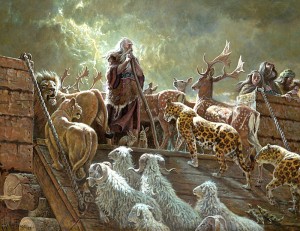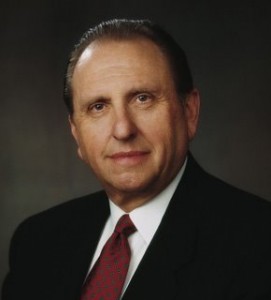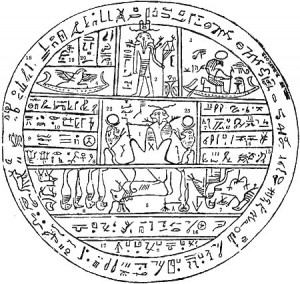Q. What do Mormons believe about the Flood?
Let me introduce to you Figure 1.

We Mormons believe in Figure 1. While certainly the artist took some creative license in recreating this scene (who ever said Noah had a giant staff?), the basic idea that it conveys is real. There was a man named Noah who gathered up a bunch of animals, put them on an ark, and then weathered one crazy storm with the miraculous help of God.
We also believe in science. For years I was a TA for physics classes at my university where I would teach everything from F=ma to quantum mechanics. I am currently working on a project for NASA that requires using more science than any grown man should ever have to use. With this background I know that there are equations and models that we’ve derived from our objective view of the universe that work. That is, we have discovered laws and theories that, as far as we know, accurately predict how our universe functions.
Sometimes science seems to butt heads with religion. Noah and the Flood is one of times. Many geologists discount the Biblical narrative of Noah as being improbable and not scientifically sound. This is fine by me. I do not need science to prove my belief in the Bible. There are many things I believe in that science can’t prove. How can people be resurrected after they have died? How can heavenly messengers such as angels defy Newton and his apple? How do miracles occur? I have chosen to place my ultimate confidence in God, not in the models and equations of science, which, in just the last couple hundred years alone, have been shown to change time and again as new experiments are performed.
The argument that geologists give that the Flood never really occurred is based on a few underlying assumptions that are important to understand. First, the concept of uniformitarianism which assumes that the natural processes that we observe occurring in our world today are the same as those operating in the past. That is, the geologic processes scientists have tracked over the last few hundred years are sufficient to predict what has happened to the earth over the past millions of years.
Another bold assumption is that God doesn’t exist. This assumption conveniently gets rid of Moses parting the Red Sea and the earth ever being modified in any unnatural way. I refute this assumption, believing Christ’s words, “If ye have faith as a grain of mustard seed, ye shall say unto this mountain, Remove hence to yonder place; and it shall remove; and nothing shall be impossible unto you” (Matthew 17:20).
I love the Bible. I know it to be the word of God. Its teachings (especially those of Christ) lead us to God and to a happier, fuller life. Science can’t always promise that.
Further reading: “The Flood and the Tower of Babel”, “The Gospel and the Scientific View: How Earth Came to Be”


 A former prophet of the church, President Gordon B. Hinckley, also remarked on this topic when he said, “The Lord has made us attractive one to another for a great purpose. But this very attraction becomes as a powder keg unless it is kept under control. . . . It is for this reason that the Church counsels against early dating” (read the amazing talk in its entirety
A former prophet of the church, President Gordon B. Hinckley, also remarked on this topic when he said, “The Lord has made us attractive one to another for a great purpose. But this very attraction becomes as a powder keg unless it is kept under control. . . . It is for this reason that the Church counsels against early dating” (read the amazing talk in its entirety  der inspiration from God. Their reasons for doing this are given in the above two statements. I see the whole thing as similar to the age requirement to be baptized. You have to be at least 8-years-old to be baptized and, while there doesn’t seem to be anything particularly special about the age of 8, Heavenly Father knew that setting that age as the standard would be in our best interest.
der inspiration from God. Their reasons for doing this are given in the above two statements. I see the whole thing as similar to the age requirement to be baptized. You have to be at least 8-years-old to be baptized and, while there doesn’t seem to be anything particularly special about the age of 8, Heavenly Father knew that setting that age as the standard would be in our best interest. Firstly and foremostly, in order to understand these books it must be understood that we believe that God still speaks to man. There is a prophet on the earth today (
Firstly and foremostly, in order to understand these books it must be understood that we believe that God still speaks to man. There is a prophet on the earth today ( of the ancient patriarch Abraham. This book sheds fascinating new light on pre-earth life and the creation (click
of the ancient patriarch Abraham. This book sheds fascinating new light on pre-earth life and the creation (click 



